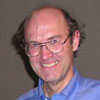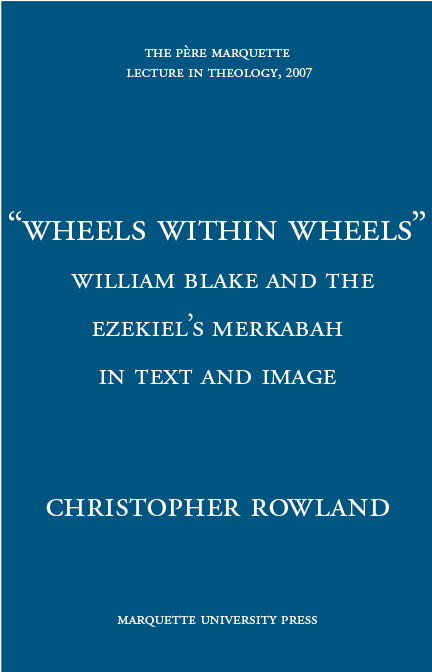Christopher Charles Rowland. "Wheels within Wheels": William Blake and the Ezekiel Merkabah in Text and Image. ISBN-13: 978-087462-587-5; ISBN-10: 0-87462-587-4. (2007, Lecture 38). 50 pp. Cloth. $15
Christopher Charles Rowland is Dean Ireland’s Professor of the Exegesis of Holy Scripture and Fellow Rowland “Wheels within Wheels” of Queen’s College, in England’s prestigious Oxford University. Born 21 May 1947, he was educated at Doncaster Grammar School and Christ’s College, Cambridge. At Cambridge, he earned the BA Theology Class I (Theological Tripos Part II with Hebrew Prize) in 1969, and a Class I Theological Tripos Part III (New Testament) in 1970. He was awarded the MA Degree in 1973, and in 1975 the PhD, for a dissertation entitled The Influence of the First Chapter of Ezekiel on Judaism and Early Christianity. From 1974 to 1979, Rowland was Lecturer in Religious Studies (with special responsibility for New Testament studies) at the University of Newcastle upon Tyne. From 1979 to 1991, he served as Fellow and Dean of Jesus College, and University Lecturer in Divinity, both at the University of Cambridge. Since that time, he has held the Dean Ireland’s professorship at Oxford University. From 1998 to 2000, he served as chair of the Faculty Board of Theology.
Rowland has published widely across the fields of New Testament and Christian origins, where he has had a special interest in apocalyptic, and liberation theology. His many books and articles testify to the broad range of his interests, including in recent years a number of important contributions to the emerging fields of the history of biblical exegesis, as well as the reception history of the Bible.
 The many books he has written or edited include: The Open Heaven: A Study of Apocalyptic in Judaism and Early Christianity (1982); Christian Origins: An Account of the Setting and Character of the Most Important Messianic Sect of Judaism (1985; revised edition, 2002;) Radical Christianity: A Reading of Recovery (1988); Liberating Exegesis: The Challenge of Liberation Theology to Biblical Studies (1989, with Mark Corner); Revelation: The Apocalypse of Jesus Christ (2004, with Judith Kovacs); Liberation Theology UK (1995, edited with John Vincent); Understanding Studying Reading: New Testament Essays in Honor of John Ashton (1998, edited with Crispin Fletcher-Louis); The Cambridge Companion to Liberation Theology (edited 1999); Radical Christian Writings: A Reader (2002, edited with Andrew Bradstock); and Apocalyptic in History and Tradition (2002, edited with John Barton).
The many books he has written or edited include: The Open Heaven: A Study of Apocalyptic in Judaism and Early Christianity (1982); Christian Origins: An Account of the Setting and Character of the Most Important Messianic Sect of Judaism (1985; revised edition, 2002;) Radical Christianity: A Reading of Recovery (1988); Liberating Exegesis: The Challenge of Liberation Theology to Biblical Studies (1989, with Mark Corner); Revelation: The Apocalypse of Jesus Christ (2004, with Judith Kovacs); Liberation Theology UK (1995, edited with John Vincent); Understanding Studying Reading: New Testament Essays in Honor of John Ashton (1998, edited with Crispin Fletcher-Louis); The Cambridge Companion to Liberation Theology (edited 1999); Radical Christian Writings: A Reader (2002, edited with Andrew Bradstock); and Apocalyptic in History and Tradition (2002, edited with John Barton).
Not content with published contributions to the field, Rowland has also been very active both in mentoring the work of younger scholars, and in cooperation with scholars in Europe, the United States, and South America. At Oxford, he founded an interdisciplinary seminar in the history of biblical interpretation, with the express intention of examining not only texts, but also a wide range of other media, including art and music. This particular interest will be put nicely on display in today’s Père Marquette Lecture. Rowland is also an editor for the Blackwell Bible Commentaries, a new series focused on the “impact history” of biblical texts. During a sabbatical leave during the present academic year, he is at work on a book on William Blake’s biblical exegesis tentatively entitled Blake and the Bible, for Yale University.






